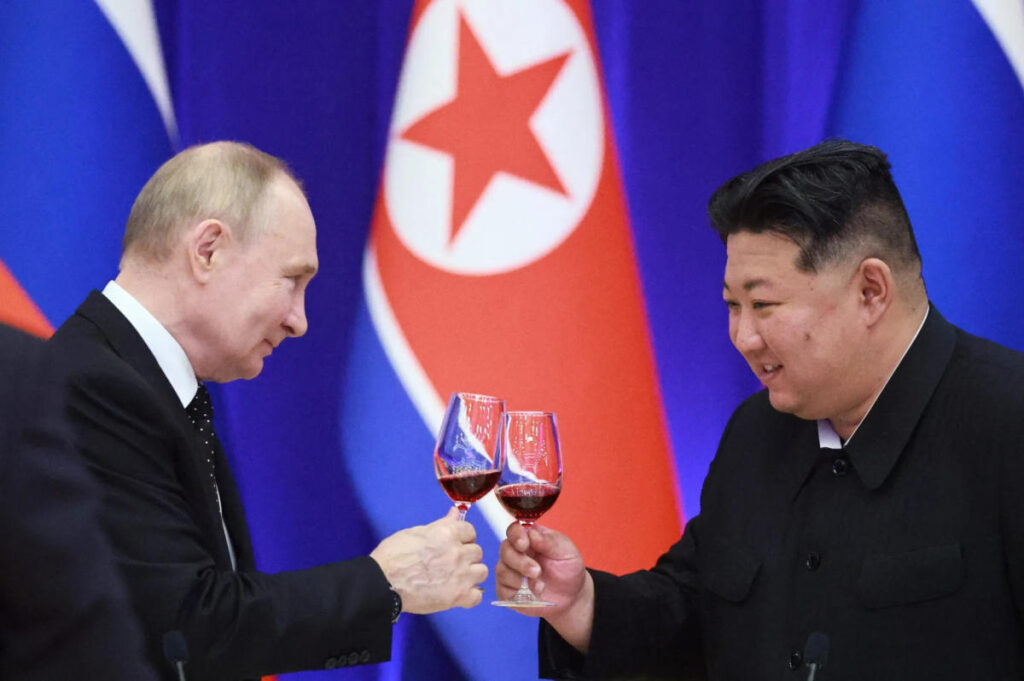Recent reports indicate that North Korea is sending troops to assist Russia in its ongoing invasion of Ukraine, revealing significant manpower limitations within the Russian military and economy. According to South Korea’s intelligence agency, facial recognition technology was employed with Ukrainian intelligence to pinpoint North Korean officers aiding Russian forces in Ukraine’s Donetsk region, specifically by operating North Korean artillery. While both Moscow and Pyongyang have denied any troop exchanges, this development suggests a closer military cooperation between the two nations, which has been previously speculated in international media.
Analysts are increasingly concerned about the stability of Russia’s economy, which appears deceptively robust due to inflated defense spending but is fundamentally weak. The consequences of Western sanctions have severely restricted Russia’s access to the global financial system. Additionally, a significant exodus of talent from the country and mounting casualties from the ongoing war have created a strained labor market and rising inflation. The military mobilization and defense industry are consuming an ever larger portion of the working-age population, which challenges President Vladimir Putin’s ability to recruit additional troops for the conflict in Ukraine.
In an op-ed, Rutgers University political scientist Alexander J. Motyl warned of an impending economic meltdown in Russia, predicting that as the economy declines and poverty rises, resources to sustain military efforts would dwindle. Motyl suggested that this economic distress could threaten not only Putin’s regime but potentially the structure of the Russian state itself, drawing parallels to other historical instances where nations have faltered due to insufficient economic resources to sustain military engagements. He posits that Putin would face a dilemma: either make societal sacrifices to bolster military spending or continue pushing his forces beyond their limits, which may merely postpone defeat.
Parallel observations were made by Stefan Hedlund, a professor of Russian studies, who emphasized the economic distortions stemming from the war and excessive military expenditure. He pointed out that substantial financial resources are being allocated to support contractors involved in the military campaigns, most of whom face high mortality rates, as well as to produce military hardware that is likely to be destroyed in combat. He warned that the viability of these efforts is questionable in the long run, while sectors outside of defense are grappling with labor shortages, escalating expenses, and the threat of increased interest rates as the central bank aims to control inflation.
Hedlund further articulated that traditional revenue sources for the Russian regime, such as exports of oil, gas, and arms, are under increasing strain due to declining prices and demand. This scenario indicates that the Russian economy is on a precarious path, which could worsen as Moscow seeks military support from North Korea, suggesting that its economic situation may begin to resemble that of its ally. Even if Russia manages to sustain some levels of exports, continued sanctions will inhibit producers from accessing critical intermediate goods, thus reducing their integration into global value chains.
Overall, the confluence of these economic pressures suggests a dire outlook for Russia. The ongoing military engagement in Ukraine is inflicting significant economic burdens, and reliance on North Korean troops stages a troubling narrative of decline for the Russian state. The erosion of economic vitality could compromise both military effectiveness and the broader stability of the nation, leading to a critical juncture for Putin’s leadership and Russia’s future viability in the global sphere.

